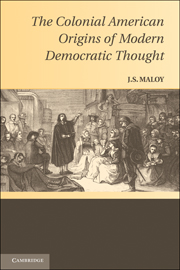Book contents
- Frontmatter
- Contents
- Preface
- 1 Introduction: Accountability and Democratic Theory
- 2 Radical Trust and Accountability in the Seventeenth Century
- 3 Fidelity and Accountability in Virginia and Bermuda
- 4 Politics and Ecclesiastics in Plymouth and Massachusetts
- 5 Constitutional Conflict and Political Argument at Boston
- 6 Democratic Constitutionalism in Connecticut and Rhode Island
- 7 Conclusion: Anglophone Radicalism and Popular Control
- Bibliography
- Index
2 - Radical Trust and Accountability in the Seventeenth Century
Published online by Cambridge University Press: 03 December 2009
- Frontmatter
- Contents
- Preface
- 1 Introduction: Accountability and Democratic Theory
- 2 Radical Trust and Accountability in the Seventeenth Century
- 3 Fidelity and Accountability in Virginia and Bermuda
- 4 Politics and Ecclesiastics in Plymouth and Massachusetts
- 5 Constitutional Conflict and Political Argument at Boston
- 6 Democratic Constitutionalism in Connecticut and Rhode Island
- 7 Conclusion: Anglophone Radicalism and Popular Control
- Bibliography
- Index
Summary
Let not your King and Parliament in One,
Much less apart, mistake themselves for that
Which is most worthy to be thought upon;
Or think they are essentially the STATE;
But let them know, 'twas for another thing,
Which they but represent; and which, ere long,
Them to a strict account will doubtless bring,
If any way they do it willful wrong:
For that, indeed, is really the Face,
Whereof they are the shadow in the glass.
George Wither, 1645 (Wildman 1645, 8)The political ideas of seventeenth-century Christendom were shaped by the historical, philosophical, and theological literatures of European societies going back over two millennia. The cumulative lessons of these literatures were usually understood to endorse variations on the theme of one-man rule, and the contemporary prevalence of large and legally centralized monarchic jurisdictions was treated, in print, with broad approval. There were numerous ways of qualifying and limiting monarchic sovereignty, of course, and it was also true that the republics of ancient Sparta and Rome, or of contemporary Venice and Geneva, were lauded by some commentators. But the archetypal democracy of ancient Athens was scarcely considered either a viable or a desirable constitutional option. Macedonian and then Roman hegemony had marked the end not only of Greek democratic practice but also, it seemed, of serious democratic thinking in the West.
This was the intellectual world from which the first English colonists in America came. But the generally anti-democratic consensus of early-modern political thinking was by no means monolithic or invulnerable.
- Type
- Chapter
- Information
- Publisher: Cambridge University PressPrint publication year: 2008



